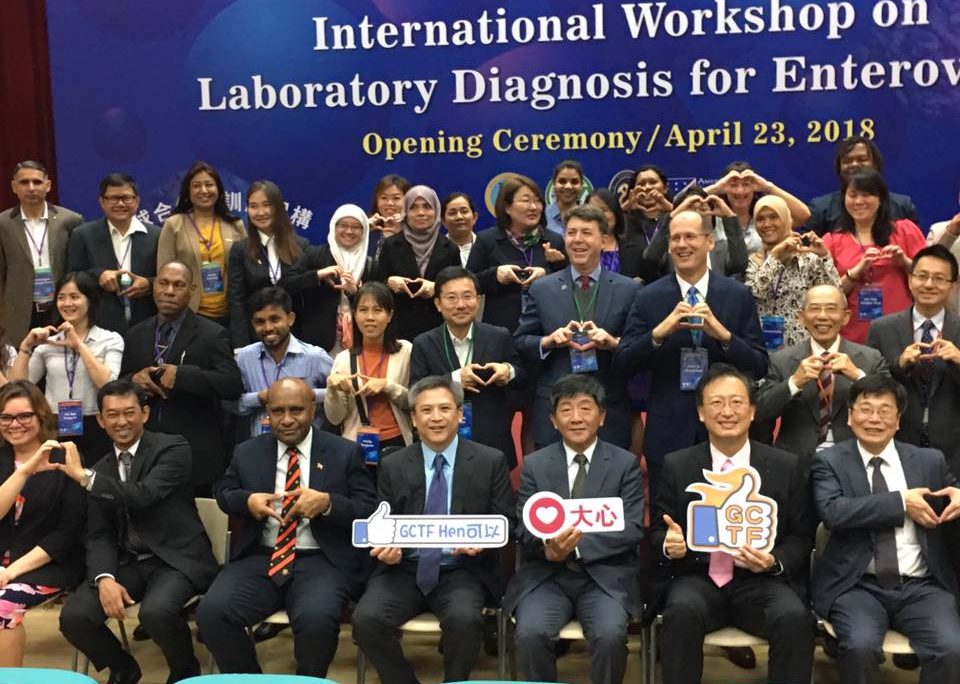Global Cooperation and Training Framework (GCTF) Enteroviruses Laboratory Diagnosis Workshop
April 23, 2018
AIT Official Text #: OT-1805
(As Prepared for Delivery)
Good morning, and welcome to Deputy Minister Wu, Health Minister Chen, and our distinguished guests from around the region.
A big thank you to my colleagues from the U.S. Centers for Disease Control who are able to be with us today to share your expertise. We are thrilled that you’ll have a chance to hear from Dr. Leonard Peruski, who’s here all the way from U.S. CDC headquarters in Atlanta, and Dr. John MacArthur, the U.S. CDC country director in Thailand.
It is my great pleasure to be with you this morning to help open this workshop on enteroviruses, held under the U.S.-Taiwan Global Cooperation and Training Framework, or GCTF as we like to call it.
I want to particularly recognize each of you who made the effort to travel here to Taiwan this week. We know you all have busy schedules but we strongly believe the kind of information-sharing and network-building that you’ll be doing this week is essential for global public health security.
Through GCTF, one of the signature programs in the U.S.-Taiwan relationship, we connect experts such as yourselves and provide opportunities for you to share best practices among each other, especially on issues such as public health, where it is critical that we work together.
This year marks the third anniversary of the GCTF, which has brought together hundreds of experts, government officials, and civil society leaders from over two dozen countries for workshops on public health, women’s empowerment, and the digital economy, among other topics.
We consider Taiwan to be a vital partner, a democratic success story, and a force for good in the world. And these programs demonstrate why Taiwan should be welcomed as part of the solution to global challenges, given its own significant experience overcoming many of these same issues.
Just 20 years ago, Taiwan suffered a severe enterovirus outbreak that affected hundreds of young children. And now Taiwan is partnering with the United States and your countries to improve our collective understanding of enteroviruses. Taiwan companies are hard at work trying to develop a vaccine for the most fatal strain of enteroviruses. Taiwan’s progress has truly been impressive.
As you all know, enteroviruses are one of the most common causes of hand, foot, and mouth disease, oftentimes with serious neurological, or even fatal, complications. And they target the weakest among us – children and infants.
Many of the countries in the region have also experienced epidemics similar to what Taiwan went through. Enterovirus infections have become a serious public health concern in the Asia-Pacific region. That is why the work you are doing this week is so important.
The United States continues to support Taiwan’s meaningful and substantive contributions to the international community. In particular, we have consistently supported Taiwan’s participation as an observer at the annual World Health Assembly and in technical meetings. We were disappointed that Taiwan did not receive an invitation to observe the World Health Assembly last year, but remain committed to advancing our close cooperation with Taiwan across the spectrum of public health issues.
The United States has always been committed to a cooperative and transparent international response to outbreaks of infectious disease. These are threats that do not respect borders and can spread rapidly to endanger people anywhere and everywhere around the globe.
It is my hope that you will leave Taiwan not only with a deeper technical knowledge of enteroviruses, but also a greater awareness of how important it is for the global community to fight these threats together. We also want you to know that you can always count on your friends and partners in the United States and here in Taiwan for assistance.
Let me extend our appreciation to Taiwan Centers for Disease Control Director General Dr. Chou and his team, as well as the Ministry of Foreign Affairs for hosting us today.
I wish you all a productive workshop and enjoyable visit to Taiwan. Thank you.
















![Video Thumbnail [Recovered]-01](../wp-content/uploads/sites/269/Video-Thumbnail-Recovered-01-1-750x450.jpg)





